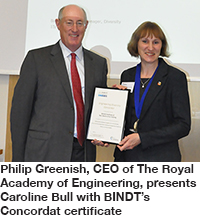BINDT signs up to Engineering Diversity Concordat
12/01/2015
Engineering is vital to the wealth and well-being of every nation. Professional engineers and technicians fulfil important roles in society and take their responsibilities seriously. A Concordat, supported by The Royal Academy of Engineering (The Academy) in its role as lead of the Diversity in Engineering Programme and funded through the Department for Business, Innovation and Skills, sets out the principles of a voluntary agreement between organisations involved at the heart of the engineering profession. It seeks to ensure that the profession properly reflects the society it serves and takes action to attract engineers from increasingly diverse backgrounds into professional membership and registration. In this way, the profession can capitalise on its diversity of thought, innovation and creativity. The Concordat is applicable across the profession and is general in nature. It is a commitment made by engineering professional bodies and is open to adoption by organisations operating within and across the engineering profession. It is based on the premise that Professional Engineering Institutions (PEIs) and other organisations operating within and across engineering will be most effective in improving the diversity of the profession when they work in partnership to achieve common aims through cooperation.
The Concordat is applicable across the profession and is general in nature. It is a commitment made by engineering professional bodies and is open to adoption by organisations operating within and across the engineering profession. It is based on the premise that Professional Engineering Institutions (PEIs) and other organisations operating within and across engineering will be most effective in improving the diversity of the profession when they work in partnership to achieve common aims through cooperation.The British Institute of NDT (BINDT) believes strongly in the principles of the Concordat and has demonstrated its commitment by signing the document at a recent ceremony at The Academy in London. President Elect Caroline Bull signed on behalf of the Institute, which joins other PEIs to bring the total number of signatories to 31.
In signing this document, each party is stating that they agree to work towards achieving the following objectives:
- Communicate commitment to equality and inclusion principles and practices;
- Take action to increase diversity amongst those in professional engineering membership and registration;
- Monitor and measure progress.
The Concordat mirrors what is currently understood as good or best practice.
It does not constitute a legally enforceable contract nor does it create any rights or obligations that are legally enforceable – it is intended to bind in honour only.